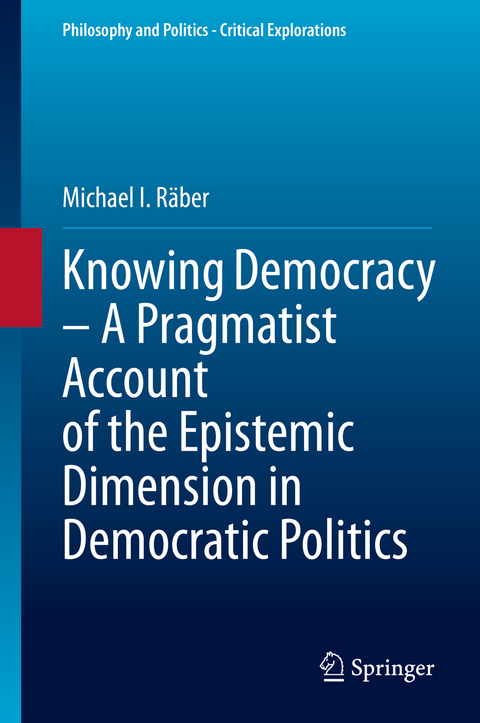
Knowing Democracy – A Pragmatist Account of the Epistemic Dimension in Democratic Politics
Springer International Publishing (Verlag)
978-3-030-53257-4 (ISBN)
How can we justify democracy's trust in the political judgments of ordinary people? In Knowing Democracy, Michael Räber situates this question between two dominant alternative paradigms of thinking about the reflective qualities of democratic life: on the one hand, recent epistemic theories of democracy, which are based on the assumption that political participation promotes truth, and, on the other hand, theories of political judgment that are indebted to Hannah Arendt's aesthetic conception of political judgment. By foregrounding the concept of political judgment in democracies, the book shows that a democratic theory of political judgments based on John Dewey's pragmatism can navigate the shortcomings of both these paradigms. While epistemic theories are overly and narrowly rationalistic and Arendtian theories are overly aesthetic, the neo-Deweyan conception of political judgment proposed in this book suggests a third path that combines the rationalist and the aesthetic elements of political conduct in a way that goes beyond a merely epistemic or a merely aesthetic conception of political judgment in democracy. The justification for democracy's trust in ordinary people's political judgments, Räber argues, resides in an egalitarian conception of democratic inquiry that blends the epistemic and the aesthetic aspects of the making of political judgments.
By offering a rigorous scholarly analysis of the epistemic and aesthetic foundations of democracy from a pragmatist perspective, Knowing Democracy contributes to the current debates in political epistemology and aesthetics and politics, both of which ask about the appropriate reflective and experiential circumstances of democratic politics. The book brings together for the first time debates on epistemic democracy, aesthetic judgment and those on pragmatist social epistemology, and establishes an original pragmatist conception of epistemic democracy.
Michael I. Räber is a post-doctoral visiting researcher at the Department of Political Science, University of California Los Angeles (UCLA). He holds a PhD in Philosophy from the University of Zurich (Switzerland). His research has been mainly focused on theories of democracy (politics and aesthetics, deliberative theory and political epistemology), political pragmatism, philosophy of art, and the history of political thought.
Chapter 1. Introduction: How to Justify Democracy's Trust in the Political Judgments of Ordinary People.- Part I: A Pragmatist Theory of Democratic Political Judgment.- Chapter 2. Democracy, Epistemology and Deweyan Pragmatism.- Chapter 3. A Pragmatist Theory of Judgment.- Chapter 4. Political Judgments and Political Inquiry: Arendt and Dewey.- Chapter 5. Judgments, Juries and the Political Sphere.- Chapter 6. Dewey's Epistemic Argument for Democracy Reconsidered.- Part II: Pragmatist Political Judgment and The Circumstances of Democratic Politics.- Chapter 7. The Epistemic Value of Diversity in Democratic Publics.- Chapter 8. Diversity, Democratic Systems and Epistemic Quality.- Chapter 9. Which Types of Knower Should Democracies Include and Why?.
| Erscheinungsdatum | 08.10.2020 |
|---|---|
| Reihe/Serie | Philosophy and Politics - Critical Explorations |
| Zusatzinfo | XVII, 211 p. 2 illus. |
| Verlagsort | Cham |
| Sprache | englisch |
| Maße | 155 x 235 mm |
| Gewicht | 499 g |
| Themenwelt | Geisteswissenschaften ► Philosophie ► Allgemeines / Lexika |
| Schlagworte | Deliberative Systems and Epistemic Quality • Democracy • Democracy and Truth-A Problematic Relationship • Democracy and Truth—A Problematic Relationship • Epistemic Dimension in Democratic Politics • Epistemic Performance of Democratic Decision- Maki • Epistemic Performance of Democratic Decision- Making Procedures • Epistemic Value of Diversity and Disagreement • Epistemic Value of Diversity in Democratic Deliber • Epistemic Value of Diversity in Democratic Deliberations • Peirce and Dewey on Truth • Political Knowers in Democracy • Pragmatist Epistemic Democracy • Pragmatist Notion of Truth • Pragmatist Social Epistemology • Social Epistemology from a Pragmatist Perspective • Social Inquiry as Democratic Praxis • Social Inquiry, Democracy and Political Judgment • The (Nut)Case of Conspiracy Theories |
| ISBN-10 | 3-030-53257-7 / 3030532577 |
| ISBN-13 | 978-3-030-53257-4 / 9783030532574 |
| Zustand | Neuware |
| Haben Sie eine Frage zum Produkt? |
aus dem Bereich


